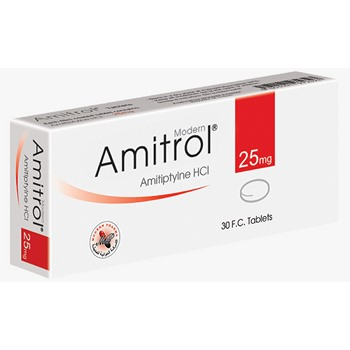Tell your doctor or pharmacist if you are taking or have recently taken any other
medicines, such as:
- Monoamine oxidase inhibitors (MAOIs) e.g. Phenelzine, Iproniazid, Isocarboxazid,
Nialamide or Tranylcypromine (used to treat depression) or Selegiline (used to treat
Parkinson's disease). These should not be taken at the same time as Amitrol® Tablets.
- Adrenaline, Ephedrine, Isoprenaline, Noradrenaline, Phenylephrine and
Phenylpropanolamine (these may be present in cough or cold medicine, and in some
anaesthetics).
- Medicine to treat high blood pressure for example calcium-channel blockers (e.g.
Diltiazem and Verapamil), Guanethidine, Bethanidine, Clonidine, Reserpine and
Methyldopa.
- Anticholinergic drugs such as certain medicines to treat Parkinsons disease and
gastrointerstinal disorders (e.g. Atropine,Hyoscyamine).
- Thioridazine (used to treat schizophrenia).
- Tramadol (painkiller).
- Medicines to treat fungal infections (e.g. Fluconazole, Terbinafine, Ketoconazole, and
Itraconazole).
- Sedatives (e.g. barbiturates).
- Antidepressants (e.g SSRIs (Fluoxetine, Paroxetine, Fluvoxamine), and bupropion).
- Medicines for certain heart conditions (e.g. beta blockers and antiarrhythmics).
- Cimetidine (used to treat stomach ulcers).
- Methylphenidate (used to treat ADHD).
- Ritonavir (used to treat HIV).
- Oral contraceptives.
- Rifampicin (to treat infections).
- Phenytoin and Carbamazepine (used to treat epilepsy).
- St. John´s Wort (hypericum perforatum) – a herbal remedy used for depressionn.
- You should also tell your doctor if you take or have recently taken medicine that
may affect the heart´s rhythm. e.g.:
- medicines to treat irregular heartbeats (e.g. Quinidine and Sotalol).
- Astemizole and Terfenadine (used to treat allergies and hayfever).
- medicines used to treat some mental illnesses (e.g. Pimozide and Sertindole).
- Cisapride (used to treat certain types of indigestion).
- Halofantrine (used to treat malaria).
- Methadone (used to treat pain and for detoxification).
- diuretics (“water tablets” e.g. Furosemide).


